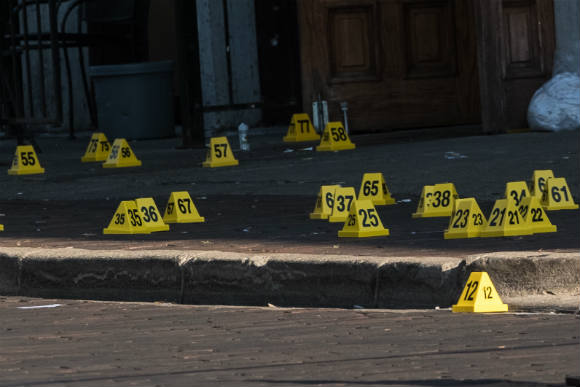By: Reid Wilson – thehill.com – August 6, 2019
States with some of the most lenient gun laws in the country will debate new restrictions meant to combat mass shootings after two assaults in El Paso, Texas, and Dayton, Ohio, left dozens dead over the weekend.
Ohio Gov. Mike DeWine (R) on Tuesday proposed a 17-point plan to curb gun violence, including measures to prohibit those who pose a risk from possessing a firearm and expanded background checks on gun purchases.
DeWine was heckled Sunday morning when he appeared in Dayton in the wake of a shooting in a popular restaurant area that left nine people dead and more than two dozen wounded. Protesters shouted “do something” as DeWine spoke.
“They were right,” DeWine said Tuesday. “It is time to do something, and that is exactly what we are going to do.”
DeWine also proposed expanded access to mental health services and early intervention in schools after officials said the Dayton shooter exhibited early warning signs of violent tendencies.
In Florida, state Senate President Bill Galvano (R) directed the chairman of the Senate Infrastructure and Security Committee to study new legislative approaches to preventing mass shootings.
In a memo to senators, Galvano said the legislature should consider how to address “white nationalism, which appears to be a factor not only with regard to these recent mass shootings, but also with other acts of violence we have seen across the country in recent years.”
“I think it’s something we need to continue to pursue,” Herbert told reporters.
Protesters in New Hampshire stormed a state office building in Concord on Monday to demand Gov. Chris Sununu (R) sign three pieces of gun safety legislation passed by the Democratic-controlled legislature. Those bills would create a three-day waiting period on gun purchases, gun-free school zones and an expanded background check program on all gun sales.
Sununu has not said whether he will sign or veto the bills once they formally reach his desk.
Walz asked state Senate Majority Leader Paul Gazelka (R) to hold hearings on universal background check legislation and a red flag law, though Gazelka appeared cool to the idea in a statement of his own. The Democratic-controlled state House has passed versions of those bills, which then stalled in the state Senate.
Raimondo faces a recalcitrant Democratic-controlled legislature, which has not yet acted on her proposals to ban assault weapons and to limit magazine sizes to ten rounds.
Most of the new proposals will still face stiff headwinds in Republican-controlled territory, even after public outrage over the latest in a long string of mass shootings that have claimed hundreds of lives this year alone.
In Ohio, DeWine’s proposals must pass the state House, where the Speaker, Larry Householder (R), aired a television advertisement last year showing himself shooting a television. One gun rights group has already lambasted the red flag proposal “confiscation.”
At the same time, Florida Attorney General Ashley Moody (R) said she would continue her bid to remove a proposed ballot measure that would ban assault rifles from next year’s ballot.
Gun safety advocates have made a significant amount of progress in state legislatures this year, most notably on red flag laws. In June, Hawaii became the 17th state in the nation to pass a version of the bill, also known as an extreme risk protection order. Before the massacre at a high school in Parkland, Fla., last year, just five states had similar laws on the books, according to Everytown for Gun Safety.
To see this article and others by The Hill, click read more.
Source: Gun debate back in focus for states after mass shootings | TheHill
 Listen Online
Listen Online Watch Online
Watch Online Find a Station in Your Area
Find a Station in Your Area








 Listen Now
Listen Now Watch Online
Watch Online
